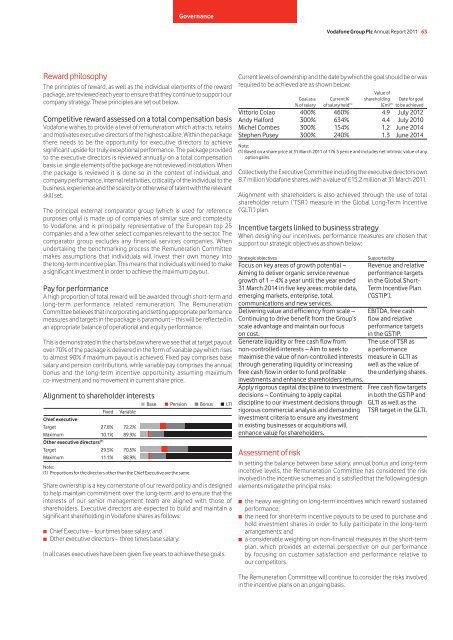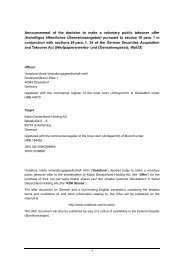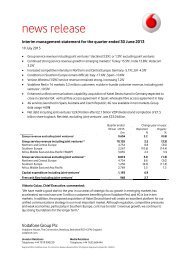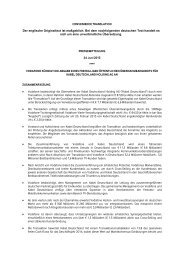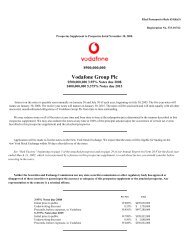Download the report - Vodafone
Download the report - Vodafone
Download the report - Vodafone
Create successful ePaper yourself
Turn your PDF publications into a flip-book with our unique Google optimized e-Paper software.
Governance<br />
Reward philosophy<br />
The principles of reward, as well as <strong>the</strong> individual elements of <strong>the</strong> reward<br />
package, are reviewed each year to ensure that <strong>the</strong>y continue to support our<br />
company strategy. These principles are set out below.<br />
Competitive reward assessed on a total compensation basis<br />
<strong>Vodafone</strong> wishes to provide a level of remuneration which attracts, retains<br />
and motivates executive directors of <strong>the</strong> highest calibre. Within <strong>the</strong> package<br />
<strong>the</strong>re needs to be <strong>the</strong> opportunity for executive directors to achieve<br />
significant upside for truly exceptional performance. The package provided<br />
to <strong>the</strong> executive directors is reviewed annually on a total compensation<br />
basis i.e. single elements of <strong>the</strong> package are not reviewed in isolation. When<br />
<strong>the</strong> package is reviewed it is done so in <strong>the</strong> context of individual and<br />
company performance, internal relativities, criticality of <strong>the</strong> individual to <strong>the</strong><br />
business, experience and <strong>the</strong> scarcity or o<strong>the</strong>rwise of talent with <strong>the</strong> relevant<br />
skill set.<br />
The principal external comparator group (which is used for reference<br />
purposes only) is made up of companies of similar size and complexity<br />
to <strong>Vodafone</strong>, and is principally representative of <strong>the</strong> European top 25<br />
companies and a few o<strong>the</strong>r select companies relevant to <strong>the</strong> sector. The<br />
comparator group excludes any financial services companies. When<br />
undertaking <strong>the</strong> benchmarking process <strong>the</strong> Remuneration Committee<br />
makes assumptions that individuals will invest <strong>the</strong>ir own money into<br />
<strong>the</strong> long-term incentive plan. This means that individuals will need to make<br />
a significant investment in order to achieve <strong>the</strong> maximum payout.<br />
Pay for performance<br />
A high proportion of total reward will be awarded through short-term and<br />
long-term performance related remuneration. The Remuneration<br />
Committee believes that incorporating and setting appropriate performance<br />
measures and targets in <strong>the</strong> package is paramount – this will be reflected in<br />
an appropriate balance of operational and equity performance.<br />
This is demonstrated in <strong>the</strong> charts below where we see that at target payout<br />
over 70% of <strong>the</strong> package is delivered in <strong>the</strong> form of variable pay which rises<br />
to almost 90% if maximum payout is achieved. Fixed pay comprises base<br />
salary and pension contributions, while variable pay comprises <strong>the</strong> annual<br />
bonus and <strong>the</strong> long-term incentive opportunity assuming maximum<br />
co-investment and no movement in current share price.<br />
Alignment to shareholder interests<br />
Chief executive<br />
Target<br />
Maximum<br />
O<strong>the</strong>r executive directors (1)<br />
Fixed Variable<br />
27.8% 72.2%<br />
10.1% 89.9%<br />
Target<br />
Maximum<br />
29.5% 70.5%<br />
11.1% 88.9%<br />
Base Pension Bonus LTI<br />
Note:<br />
(1) Proportions for <strong>the</strong> directors o<strong>the</strong>r than <strong>the</strong> Chief Executive are <strong>the</strong> same.<br />
Share ownership is a key cornerstone of our reward policy and is designed<br />
to help maintain commitment over <strong>the</strong> long-term, and to ensure that <strong>the</strong><br />
interests of our senior management team are aligned with those of<br />
shareholders. Executive directors are expected to build and maintain a<br />
significant shareholding in <strong>Vodafone</strong> shares as follows:<br />
■■ Chief Executive – four times base salary; and<br />
■■ O<strong>the</strong>r executive directors – three times base salary.<br />
In all cases executives have been given five years to achieve <strong>the</strong>se goals.<br />
<strong>Vodafone</strong> Group Plc Annual Report 2011 63<br />
Current levels of ownership and <strong>the</strong> date by which <strong>the</strong> goal should be or was<br />
required to be achieved are as shown below:<br />
Goal as a<br />
% of salary<br />
Current %<br />
of salary held (1)<br />
Value of<br />
shareholding<br />
(£m) (1)<br />
Date for goal<br />
to be achieved<br />
Vittorio Colao 400% 460% 4.9 July 2012<br />
Andy Halford 300% 634% 4.4 July 2010<br />
Michel Combes 300% 154% 1.2 June 2014<br />
Stephen Pusey 300% 240% 1.3 June 2014<br />
Note:<br />
(1) Based on a share price at 31 March 2011 of 176.5 pence and includes net intrinsic value of any<br />
option gains.<br />
Collectively <strong>the</strong> Executive Committee including <strong>the</strong> executive directors own<br />
8.7 million <strong>Vodafone</strong> shares, with a value of £15.2 million at 31 March 2011.<br />
Alignment with shareholders is also achieved through <strong>the</strong> use of total<br />
shareholder return (‘TSR’) measure in <strong>the</strong> Global Long-Term Incentive<br />
(‘GLTI’) plan.<br />
Incentive targets linked to business strategy<br />
When designing our incentives, performance measures are chosen that<br />
support our strategic objectives as shown below:<br />
Strategic objectives Supported by<br />
Focus on key areas of growth potential –<br />
Aiming to deliver organic service revenue<br />
growth of 1 – 4% a year until <strong>the</strong> year ended<br />
31 March 2014 in five key areas: mobile data,<br />
emerging markets, enterprise, total<br />
communications and new services.<br />
Delivering value and efficiency from scale –<br />
Continuing to drive benefit from <strong>the</strong> Group’s<br />
scale advantage and maintain our focus<br />
on cost.<br />
Generate liquidity or free cash flow from<br />
non-controlled interests – Aim to seek to<br />
maximise <strong>the</strong> value of non-controlled interests<br />
through generating liquidity or increasing<br />
free cash flow in order to fund profitable<br />
investments and enhance shareholders returns.<br />
Apply rigorous capital discipline to investment<br />
decisions – Continuing to apply capital<br />
discipline to our investment decisions through<br />
rigorous commercial analysis and demanding<br />
investment criteria to ensure any investment<br />
in existing businesses or acquisitions will<br />
enhance value for shareholders.<br />
Revenue and relative<br />
performance targets<br />
in <strong>the</strong> Global Short-<br />
Term Incentive Plan<br />
(‘GSTIP’).<br />
EBITDA, free cash<br />
flow and relative<br />
performance targets<br />
in <strong>the</strong> GSTIP.<br />
The use of TSR as<br />
a performance<br />
measure in GLTI as<br />
well as <strong>the</strong> value of<br />
<strong>the</strong> underlying shares.<br />
Free cash flow targets<br />
in both <strong>the</strong> GSTIP and<br />
GLTI as well as <strong>the</strong><br />
TSR target in <strong>the</strong> GLTI.<br />
Assessment of risk<br />
In setting <strong>the</strong> balance between base salary, annual bonus and long-term<br />
incentive levels, <strong>the</strong> Remuneration Committee has considered <strong>the</strong> risk<br />
involved in <strong>the</strong> incentive schemes and is satisfied that <strong>the</strong> following design<br />
elements mitigate <strong>the</strong> principal risks:<br />
■■ <strong>the</strong> heavy weighting on long-term incentives which reward sustained<br />
performance;<br />
■■ <strong>the</strong> need for short-term incentive payouts to be used to purchase and<br />
hold investment shares in order to fully participate in <strong>the</strong> long-term<br />
arrangements; and<br />
■■ a considerable weighting on non-financial measures in <strong>the</strong> short-term<br />
plan, which provides an external perspective on our performance<br />
by focusing on customer satisfaction and performance relative to<br />
our competitors.<br />
The Remuneration Committee will continue to consider <strong>the</strong> risks involved<br />
in <strong>the</strong> incentive plans on an ongoing basis.


